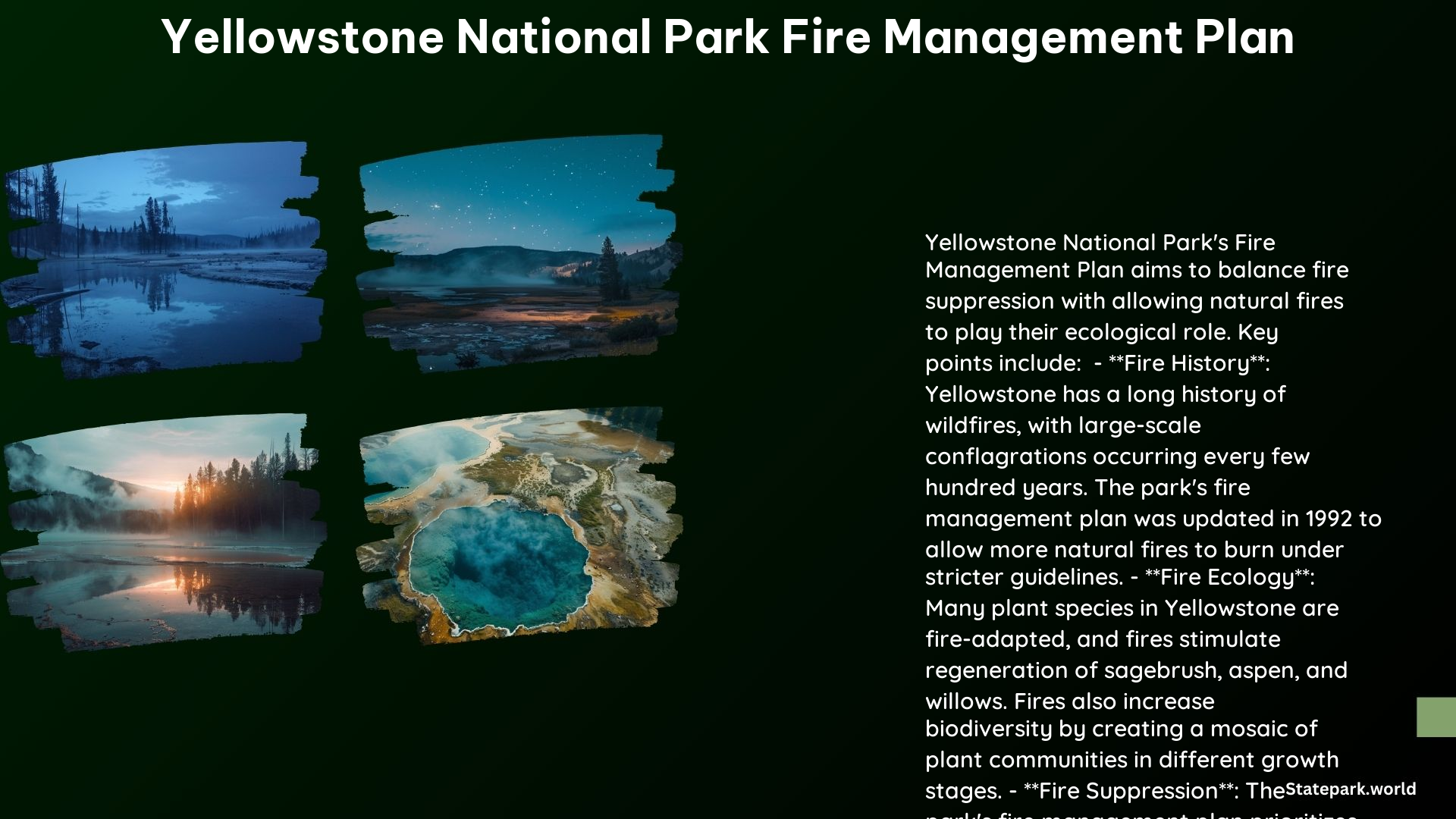The Yellowstone National Park Fire Management Plan is a comprehensive strategy for managing wildfires within the park. This plan aims to balance the ecological benefits of fire with the need to protect human life and property, ensuring the long-term health and resilience of the Yellowstone ecosystem.
Strategies for Balancing Fire Suppression and Natural Fire Benefits
Allowing Natural Fires to Burn
The Yellowstone National Park Fire Management Plan permits lightning-caused fires to burn under natural conditions if they do not pose a threat to human life and property. This approach allows fire to play its ecological role in the park, promoting habitat diversity and nutrient cycling.
Suppression of Human-Caused Fires
The plan prioritizes the suppression of human-caused wildfires to ensure public safety and protect park resources. This includes using minimum impact suppression tactics to minimize damage to the environment.
Multiple Objectives Management
Fire personnel can manage a fire for multiple objectives, such as suppressing one side of a fire to protect structures and people while allowing another side to burn for ecological benefits. Examples of this approach include the Antelope Fire of 2010 and the Arnica Fire of 2009.
Addressing the Role of Fire in Ecosystem Health and Restoration

Ecological Role of Fire
The plan recognizes fire as a natural process that shapes the park’s ecosystem. Fire promotes habitat diversity, removes forest overstory, and releases nutrients, which are essential for plant growth.
Fire-Adapted Plant Species
Many plant species in Yellowstone, such as lodgepole pines, have evolved adaptations to survive and thrive after fires. The plan acknowledges the importance of these species in maintaining ecosystem health.
Fire Regimes and Biodiversity
The plan aims to restore fire regimes that existed before European settlement, which will help maintain biodiversity by creating a mosaic of plant communities in different growth stages.
Implementation and Coordination
Interagency Cooperation
The plan involves cooperation with other federal agencies, state and local governments, and private contractors to manage fires effectively. This includes sharing resources, such as smoke jumpers and helicopters, and developing Community Wildfire Protection Plans.
Fire Management Objectives
The plan sets specific objectives, such as protecting human life and park resources, allowing natural fires to burn, and reducing hazardous fuels. These objectives guide the park’s fire management activities.
Monitoring and Research
The plan incorporates ongoing monitoring and research to improve fire management strategies and tactics. This includes correlating data from fuels monitoring with fire weather readings and supporting research on prescribed fire and other fire management topics.
Key Statistics and Data Points
| Statistic | Value |
|---|---|
| Average Fires per Year | 24 fires per year |
| Average Acres Burned per Year | 5,466 acres (excluding the 1988 outlier year) |
| Largest Fire in History | The 1988 fires burned approximately 1.4 million acres in the Greater Yellowstone Ecosystem |
| Fire Season | Typically lasts from July to the end of September |
The Yellowstone National Park Fire Management Plan is a comprehensive and adaptive approach to managing wildfires within the park. By balancing the ecological benefits of fire with the need to protect public safety, the plan aims to maintain the long-term health and resilience of the Yellowstone ecosystem.
References
- PBS Online. (n.d.). Yellowstone: Shaped by Fire. Retrieved from https://www.pbs.org/edens/yellowstone/shaped.html
- National Park Service. (2023). Wildland Fire: Plans and Policy. Retrieved from https://www.nps.gov/subjects/fire/wildland-fire-plans-and-policy.htm
- National Park Service. (2024). Fire – Yellowstone National Park. Retrieved from https://www.nps.gov/yell/learn/nature/fire.htm
- National Park Service. (2014). Yellowstone National Park 2014 Fire Management Plan. Retrieved from https://www.nps.gov/yell/learn/management/upload/YELL-2014-FMP-Final_sm.pdf
- National Park Service. (2023). Fire Management – Yellowstone National Park. Retrieved from https://www.nps.gov/yell/learn/management/fire-management.htm
